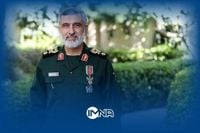On June 13, 2025, Brigadier General Amirali Hajizadeh, the commander of the Islamic Revolutionary Guard Corps (IRGC) Aerospace Force, was martyred during a coordinated aerial attack by the Israeli regime on multiple locations across Iran. The attack, described by Iranian sources as a terrorist and vicious assault, targeted one of the IRGC's key centers, resulting in the deaths of Hajizadeh and several brave and self-sacrificing fighters of the Aerospace Force.
Born on March 1, 1962, in Tehran to parents originally from Khorramdasht, Karaj, Hajizadeh was a towering figure in Iran’s military landscape. He embarked on his military career in 1980, at the age of 19, during the early days of the Iran-Iraq War, known in Iran as the Imposed War. As a sharpshooter, he actively participated in pivotal operations such as Valfajr 8 and Karbala 4 and 5, staying on the front lines until the war's conclusion.
Following the war, Hajizadeh transitioned into the missile and aerospace domain of the IRGC, becoming a prominent student of the late martyr Hassan Tehrani Moghaddam, a pioneer in Iran’s missile program. His expertise and leadership in sensitive missile centers laid the foundation for a distinguished career. By 2006, he was appointed commander of the IRGC Air Defense, and in October 2009, the Supreme Leader appointed him as the first commander of the IRGC Aerospace Force—a position he held with distinction until his martyrdom.
During his 16-year tenure commanding the Aerospace Force, Hajizadeh was instrumental in elevating Iran’s deterrent capabilities. He was known for his strategic acumen, humility, and unwavering dedication. Under his leadership, the Aerospace Force became a formidable pillar of Iran’s national security and a symbol of technological progress and military innovation.
Among the notable military operations overseen by Hajizadeh was Operation Laylat al-Qadr in June 2017, Iran’s missile retaliation against the ISIS terrorist attack on the Iranian Parliament. In this operation, six Zolfaghar and Qiam missiles struck ISIS headquarters, delivering a decisive blow to the terrorist group. Another significant event occurred in September 2018, when, following the martyrdom of 11 IRGC forces in a terrorist attack in Marivan, the Aerospace Force, in cooperation with drone units, targeted the terrorists’ positions with precision missile strikes.
Perhaps one of the most publicized military achievements during his command was the destruction of a U.S. Global Hawk spy drone in June 2019, a clear demonstration of Iran’s growing aerial defense capabilities.
The IRGC’s public relations office issued a statement mourning the loss of Hajizadeh, describing him as a “tireless warrior” who devoted his life to enhancing the Islamic Republic’s deterrent power and safeguarding the country’s security and independence. The statement emphasized that his martyrdom, alongside other commanders and fighters, exposed the terrorist nature of the Israeli regime and its fear of the Islamic Revolution’s frontline leaders.
Despite the grievous loss, the IRGC vowed that this criminal act would not undermine the steadfast path of the Iranian nation and its armed forces. Instead, it would strengthen the resolve for a harsh retaliation and continuation of the honorable struggle in the way of God.
In a message to the Iranian people following the attack, the Supreme Leader declared, “The regime must await a harsh punishment. The powerful hand of the Islamic Republic’s armed forces will not abandon it, God willing.” This underscored the gravity with which Iran views the attack and its commitment to responding decisively at an appropriate time and place.
The martyrdom of Hajizadeh has resonated deeply across Iran. His son shared a poignant story on social media, mourning the loss of his father, a public figure respected not only for his military prowess but also for his personal qualities of honesty, intelligence, humility, and sincerity.
Hajizadeh’s legacy is also marked by his close association with the resistance front. He was regarded as one of the prominent faces of the resistance and a symbol of progress and power in Iran’s defense and missile sectors. His leadership transformed the IRGC Aerospace Force into a key deterrent force, much to the chagrin of Iran’s adversaries.
Throughout his career, Hajizadeh demonstrated a jihadi spirit, a commitment to truth, and a strategic vision that made the Aerospace Force a thorn in the side of enemies. His role in historic operations, such as the missile responses to terrorist attacks and the downing of foreign drones, established him as a central figure in Iran’s modern military history.
The attack that claimed his life was part of a broader Israeli offensive targeting dozens of points within Iran, which also resulted in the deaths of several other IRGC commanders and nuclear scientists. This coordinated strike highlights the escalating tensions and the dangerous volatility in the region.
Iranian officials have called on the nation to maintain calm and unity, warning against falling prey to psychological warfare and propaganda from foreign enemies and their internal collaborators. The public is urged to support the IRGC and the armed forces as they navigate this critical moment.
The martyrdom of Amirali Hajizadeh is not just a loss of a military commander but a symbolic blow to Iran’s defense establishment. Yet, it also serves as a rallying point, reinforcing the nation’s determination to continue its path of resistance and self-defense.
As Iran mourns one of its most distinguished commanders, the world watches a region on edge, where acts of violence and retaliation risk spiraling into further conflict. Hajizadeh’s death marks a significant and somber chapter in this ongoing saga.




